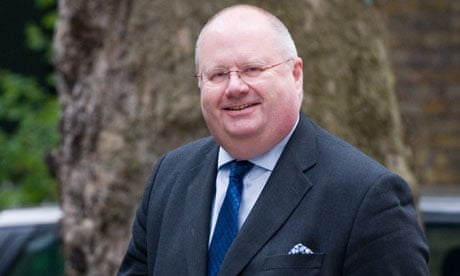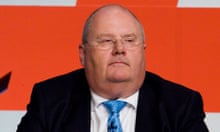The communities secretary, Eric Pickles, today announced the biggest cuts to council budgets in recent times, but was forced to provide an emergency £85m fund to prevent the poorest areas from having their funding decimated.
The government has staged a last-minute U-turn by partially reversing plans to front-load reductions in the next year and by topping up some council funds to cap this year's reductions at 8.9%. The average cut this year will be 4.4%, Pickles told the Commons.
The councils that face the biggest cuts are still overwhelmingly the poorest in the country, including many London boroughs and northern towns. In contrast, many of the "shire" councils face negligible cuts. Hackney, Tower Hamlets, Newham, Manchester, Rochdale, Knowsley, Liverpool, St Helens, Doncaster and South Tyneside are among the 36 local authorities that take the maximum cut of 8.9%.
Meanwhile, Dorset gets a 0.25% increase in funding and Windsor and Maidenhead, West Sussex, Wokingham, Richmond upon Thames and Buckinghamshire all get cuts of 1% or below.
Pickles insisted they had applied the fairest possible formula. "By adopting an intelligent and fair approach to the way funding is allocated we have been able to ensure those parts of the country that are most reliant on central funding continue to get the lion's share of the taxpayers' money that is available. Funding fairness underpins this settlement."
He added: "We are protecting the public from excessive council tax rises by stopping any council tax revaluation and setting up a £650m fund so town halls can freeze council tax this April. This will offer real help to families and pensioners.
"Taxpayers are no longer prepared to write a blank cheque for the public sector. But they do want less interference in their local communities from Whitehall government. So the coalition government is delivering the most significant shift in power from officials in London to elected local councils in a generation."
The discrepancy in funding arises from the fact that poorest areas are the most dependent on central government funding. In contrast, wealthy areas that receive a lot in council tax are getting extra subsidies after the government promised more central funding to subsidise a freeze in council tax payments.
The move comes amid a flurry of announcements of funding decisions, including:
Overall, councils to be given £29bn for this year and £27bn for next year.
The education budget for next year is revealed, including the "pupil premium", which will give schools an additional £430 for every pupil they admit who qualifies for free school meals. The education department today confirmed it could no longer deliver its promise of a 0.1% real-terms year-on-year increase. This is because the Office for Budget Responsibility revised the inflation figures, meaning that the £3.6bn cash increase would now result in a marginal cut in budgets. Some £2.5bn of the additional funding will go on the "pupil premium", and £1.1bn on additional pupil places.
Each of the 43 police forces in England and Wales are to see a 5.1% cut in funding next year and a 6.7% reduction in 2012-13.
The budget for policing the Olympics in 2012 has been unexpectedly slashed from £600m to £475m. The money will still be made available, but ministers believe it can be done more cheaply. The prime minister's spokesman said: "The security funding for the Olympics has been protected. What the detail of the announcement says today is that we believe it is possible to deliver the security of the Olympics for around £475m, but that the £600m which had been made available will remain available if necessary. We think that it's possible to be more efficient in many public services"
Pickles also published the localism bill today, announcing 12 new mayors in major cities, subject to consultation, and giving councils new powers to set up banks and lending facilities. New measures will be introduced to cut red tape to aid community groups that want to buy council buildings or take over services.
Town halls had been bracing themselves for an average cut of 10.7% in cash terms, after the government ordered the front-loading of the 27% reduction in council spending over the next four years. Without the new transitional funding that could have meant as much as 20% reductions for some councils, and 2% for others.
The cuts will lead to the first major wave of announcements of the closure of library, sports and childcare facilities, marking the moment that the £81bn national deficit reduction plan starts affecting local neighbourhoods.




